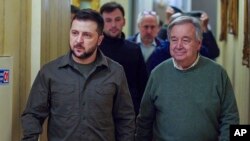U.N. Secretary-General Antonio Guterres pledged that the world body would not give up on ending Russia's war in Ukraine and would scale up support to the Ukrainian people during a visit Thursday to Kyiv.
"This war must end, and peace must be established in line with the charter of the United Nations and international law," Guterres said during a joint press conference with Ukrainian President Volodymyr Zelenskyy.
The two leaders met for 90 minutes Thursday at Zelenskyy's office in the capital.
"I am here to focus on ways on how the U.N. can expand support for the people of Ukraine, saving lives, reduce suffering and help find the path of peace," the U.N. chief said. "I want the Ukrainian people to know that the world sees you, hears you, and is in awe of your resilience and resolve."
Guterres, who had been criticized in Kyiv for going to Moscow first, was clear on the U.N. position on the war.
"As I said in Moscow, Russia's invasion of Ukraine is a violation of its territorial integrity and of the Charter of the United Nations," he said.
Defending the Charter
Zelenskyy said he believes the U.N. is making Ukraine a priority.
"In Ukraine, we are defending the principles of the U.N. Charter," Zelenskyy said. "I'm grateful to Mr. Guterres for his clear, straightforward position with regards to the war unleashed by Russia against Ukraine. We value your attempts to use the goodwill mechanism. We need to use any option for the sake of peace."
The capital was not quiet during the visit. Explosions could be heard during the news conference, and Ukraine's foreign minister tweeted that the Russians had targeted the city with cruise missiles.
Zelenskyy said his discussion with the U.N. chief covered issues including ending Russia's blockade of Ukrainian ports so it could export grain to the world and ease rising wheat and maize prices, and lessen shortages to many developing countries.
Mariupol
Guterres arrived in Ukraine after a stop Tuesday in Moscow where he held a nearly two-hour meeting with President Vladimir Putin.
The U.N. has been trying unsuccessfully for weeks to get safe humanitarian corridors or a pause in the fighting to allow aid into besieged areas and to get civilians out.
The U.N. said following Guterres' meeting that the Russian president had agreed "in principle" to allow the U.N. and the International Committee of the Red Cross to evacuate hundreds of civilians sheltering in the Azovstal steel plant in the besieged southern city of Mariupol.
"As we speak, there are intense discussions to move forward on this proposal to make it a reality," Guterres said in Kyiv.
He said the people trapped in Mariupol, many of them elderly, "need an escape route out of the apocalypse."
Pressed for details by a reporter on what guarantees Putin gave him regarding the evacuations, Guterres refused to be drawn into revealing anything that could derail the sensitive operation.
"Do you want the people to be rescued, or do you want me to say something that will be an obstacle to that rescue?" Guterres said to the reporter. "At the present moment, I can only tell you we are doing everything we can to make it happen."
Osnat Lubrani, U.N. resident and humanitarian coordinator for Ukraine, tweeted Thursday that she was on her way to Zaporizhzhia to prepare for the "hopeful evacuation from Mariupol."
'Horrendous site'
Before his meeting with Zelenskyy, the U.N. chief went to the Kyiv suburbs of Bucha, Irpin and Borodyanka. He saw a mass grave in the town of Bucha, where scores of bodies of civilians were found after Russian forces withdrew from the area one month ago.
"When we see this horrendous site, it makes me feel how important it is [to have] a thorough investigation and accountability," Guterres told reporters at the site.
The International Criminal Court, the Ukrainian prosecutor general and several other rights groups and governments are involved in the collection of evidence for future war crimes trials.
"I fully support the International Criminal Court, and I appeal to the Russian Federation to accept to cooperate with the International Criminal Court," Guterres said. "But when we talk about war crimes, we cannot forget that the worst of crimes is war itself."
Surveying the damage to buildings in Borodyanka, Guterres said that war in the 21st century "is an absurdity" and "evil."
"Wherever there is a war, the highest price is paid by civilians," he said in Irpin.




